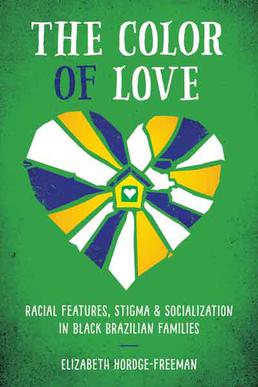Racial color blindness refers to the belief that a person's race or ethnicity should not influence their legal or social treatment in society.
Critical race theory (CRT) is an interdisciplinary academic field focused on the relationships between social conceptions of race and ethnicity, social and political laws, and media. CRT also considers racism to be systemic in various laws and rules, and not only based on individuals' prejudices. The word critical in the name is an academic reference to critical theory rather than criticizing or blaming individuals.

Benedita Souza da Silva Sampaio is a Brazilian politician. From a working-class background, she faced class and racial prejudice, overcoming it to become the first female and Afro-Brazilian governor of the State of Rio de Janeiro and, later, Minister of the said Secretary of State as well in the Government of Luiz Inácio Lula da Silva. She
Reverse racism, sometimes referred to as reverse discrimination, is the concept that affirmative action and similar color-conscious programs for redressing racial inequality are forms of anti-white racism. The concept is often associated with conservative social movements and reflects a belief that social and economic gains by Black people and other people of color cause disadvantages for white people.

France Winddance Twine is a Black and Native American sociologist, ethnographer, visual artist, and documentary filmmaker. Twine has conducted field research in Brazil, the UK, and the United States on race, racism, and anti-racism. She has published 11 books and more than 100 articles, review essays, and books on these topics.
Racial literacy is a concept developed by sociologist France Winddance Twine. She describes it as "a form of racial socialization and antiracist training that ... parents of African-descent children practiced in their efforts to defend their children against racism" in her research done in the United Kingdom with mixed-race families.

The term social apartheid has been used to describe various aspects of economic inequality in Brazil, drawing a parallel with the legally enforced separation of whites and blacks in South African society for several decades during the 20th-century apartheid regime.
Racial whitening, or "whitening" (branqueamento), is an ideology that was widely accepted in Brazil between 1889 and 1914, as the solution to the "Negro problem". Whitening in Brazil is a sociological term to explain the change in perception of one's race, from darker to lighter identifiers, as a person rises in the class structure of Brazil. Racial mixing in Brazilian society entailed that minority races ought to adopt the characteristics of the white race, with the goal of creating a singular Brazilian race that emulates the white race, striving to create a society best emulating that of Europe.
Racial democracy is a concept that denies the existence of racism in Brazil. Some scholars of race relations in Brazil argue that the country has escaped racism and racial discrimination. Those researchers cite the fact that most Brazilians claim not to view others through the lens of race, and thus the idea of racial discrimination is irrelevant.
Black Hispanic and Latino Americans, also called Afro-Hispanics, Afro-Latinos, Black Hispanics, or Black Latinos, are classified by the United States Census Bureau, Office of Management and Budget, and other U.S. government agencies as Black people living in the United States with ancestry in Latin America, Spain or Portugal and/or who speak Spanish, and/or Portuguese as either their first language or second language.
The continent of South America is culturally and racially diverse. This article examines by country and region the current and historical trends in race relations and racism within South America. Racism of various forms is to be found worldwide. Racism is widely condemned throughout the world, with 170 states signatories of the International Convention on the Elimination of All Forms of Racial Discrimination by August 8, 2006. In different countries, the forms that racism takes may be different for historic, cultural, religious, economic or demographic reasons.
Racism in Cuba refers to racial discrimination in Cuba. In Cuba, dark skinned Afro-Cubans are the only group on the island referred to as black while lighter skinned, mixed race, Afro-Cuban mulattos are often not characterized as fully black or fully white. Race conceptions in Cuba are unique because of its long history of racial mixing and appeals to a "raceless" society. The Cuban census reports that 65% of the population is white while foreign figures report an estimate of the number of whites at anywhere from 40 to 45 percent. This is likely due to the self-identifying mulattos who are sometimes designated officially as white. A common myth in Cuba is that every Cuban has at least some African ancestry, influenced by historical mestizaje nationalism. Given the high number of immigrants from Europe in the 20th century, this is far from true. Several pivotal events have impacted race relations on the island. Using the historic race-blind nationalism first established around the time of independence, Cuba has navigated the abolition of slavery, the suppression of black clubs and political parties, the revolution and its aftermath, and the special period.

There is no single system of races or ethnicities that covers all modern Latin America, and usage of labels may vary substantially.

The sociology of race and ethnic relations is the study of social, political, and economic relations between races and ethnicities at all levels of society. This area encompasses the study of systemic racism, like residential segregation and other complex social processes between different racial and ethnic groups.

Blanqueamiento in Spanish, or branqueamento in Portuguese, is a social, political, and economic practice used in many post-colonial countries in the Americas and Oceania to "improve the race" towards a supposed ideal of whiteness. The term blanqueamiento is rooted in Latin America and is used more or less synonymously with racial whitening. However, blanqueamiento can be considered in both the symbolic and biological sense. Symbolically, blanqueamiento represents an ideology that emerged from legacies of European colonialism, described by Anibal Quijano's theory of coloniality of power, which caters to white dominance in social hierarchies. Biologically, blanqueamiento is the process of whitening by marrying a lighter-skinned individual to produce lighter-skinned offspring.
Racism has been present in Brazil since its colonial period and is pointed as one of the major and most widespread types of discrimination, if not the most, in the country by several anthropologists, sociologists, jurists, historians and others. The myth of a racial democracy, a term originally coined by Brazilian sociologist Gilberto Freyre in his 1933 work Casa-Grande & Senzala, is used by many people in the country to deny or downplay the existence and the broad extension of racism in Brazil.
Kwame Dixon is a political scientist and human rights activist who specializes on race in the Americas. His field of interest is in African descendant people living in Latin America, North America and South America. He is a professor of Afro-Latino Studies, Race, Democracy and Human Rights for Afro-Latin Americans. He currently works at Howard University as a professor in the department of African American Studies. He contributes articles to The Hemispheric Institute E-misférica, He is also a consultant for NGO's like Consultant – Club of Madrid Expert: African Women's Leadership Project.
Eduardo Bonilla-Silva is an American sociologist and professor of sociology at Duke University. He was the 2018 president of the American Sociological Association.

The Color of Love: Racial Features, Stigma, and Socialization in Black Brazilian Families is a book by sociologist Elizabeth Hordge-Freeman published in 2015 by the University of Texas Press. The book details how racial hierarchies impact family interactions and treatment in Brazil and how these actions impact the well-being of the family members.

Juliet Hooker is a Nicaraguan-born political scientist who currently holds the Royce Family Professorship of Teaching Excellence in Political Science at Brown University. She is a political philosopher who focuses on racial justice, the theory of multiculturalism, and the political thought of the Americas.








